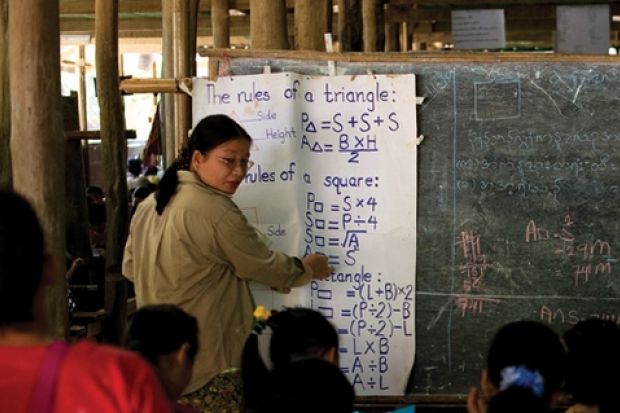For more than a decade, people fleeing the military junta in Burma have found a refuge on the Thai border.
Now home to an estimated 150,000 people, the nine unofficial refugee camps have their own internal economies, with amenities such as schools, cafes and farms.
In the midst of all this, an academic from the UK is leading a pilot project providing higher education to a select few students from seven of the camps in the hope that it will benefit the entire community.
Anthony Russell, a senior lecturer in the department of education at Anglia Ruskin University, adapted the Global Border Studies course from a project he ran in conjunction with Dundalk Institute of Technology and the University of Ulster to educate community leaders on both sides of the conflict in Northern Ireland.
Parallels between the Burmese refugee camps and Northern Ireland, while not at first apparent, ran deep, according to Mr Russell.
"At the time I was at the camp, the students were looking at the Belfast census to see how the ethnic development of Belfast was similar to the ethnic development of the Nu Po camp," he said. "It was a very fulfilling and strange experience."
For the Global Border Studies course, 15 refugees working as teachers or community workers in the camps were selected from more than 250 applicants to study at the Nu Po camp in the Amphoe Umphang administrative area.
The project was set up in collaboration with Dundalk and World Education, a private voluntary organisation founded in 1951 to help meet the needs of the educationally disadvantaged. It now has further support from several other organisations.
Mr Russell said the course has been adapted to have a strong emphasis on ethnic conflict and its resolution.
The students will also focus on how the camp has evolved following the influx of refugees after Burma's Saffron Revolution of 2007.
"The way that new refugees have divided themselves within the camp is the same way any incoming immigrant ethnic groups will divide themselves, whether they are in New York, Belfast or Nu Po," he said.
"When ethnic groups come in to a particular area they tend to form a model of separation, and Nu Po was no different."
Lessons take place in a bamboo hut in the camp, which is two days away from the nearest town. Because of the remote location, computers are run on solar power.
"We have to have a bamboo campus because the Thai authorities do not recognise the settlements as refugee camps," Mr Russell said.
"They are called temporary residence camps, because if it's a refugee camp it has rights and permanence.
"Therefore they are only allowed to build with bamboo."
At present, the course is not accredited by Anglia Ruskin but has an internal accreditation within the camp. "Such accreditation gives the students better potential for mobility. The idea is that these community workers and teachers will go back into the refugee camps, back into their communities and spend four or five years working there," Mr Russell explained.
He said he hoped the project would evolve to give students the option of external accreditation when they finish a period of work in the community.
